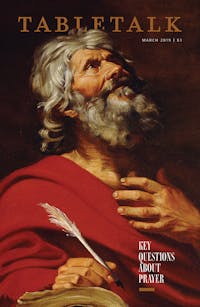
Request your free, three-month trial to Tabletalk magazine. You’ll receive the print issue monthly and gain immediate digital access to decades of archives. This trial is risk-free. No credit card required.
Try Tabletalk NowAlready receive Tabletalk magazine every month?
Verify your email address to gain unlimited access.
As I write this, I’m in the final phase of training for a marathon row. Yes, a row, not a run. Rowing 42,195 meters on the Concept2 erg rowing machine is the equivalent of running 26.2 miles. I expect this event to take me around three and a half hours to complete. My training over the past four months has been centered on building my endurance. Through the training one develops a tolerance for the discomfort, a mental fortitude to push through the painful points. I (and anyone else who attempts an event like this) have need of endurance.
This is what the pastor says to the Hebrews in 10:35–36:
Therefore do not throw away your confidence, which has a great reward. For you have need of endurance, so that when you have done the will of God you may receive what is promised.
What is interesting, though, is how the author of Hebrews begins to address their concerns. He wants them to endure, but he doesn’t start out his message to them by saying: “Hold on,” “Don’t be discouraged,” or “Keep the faith.” These are all things that he will say and imply later in the letter, but not at the opening. Instead, he begins with a theological point: the unrivaled glory, majesty, and authority of the Son of God.
There is perhaps no other chapter in the Bible that sets forth the divinity of Jesus Christ more strongly than the first chapter of Hebrews. However, the author does not give head knowledge separate from the heart. What I love is that all of this rich theology about Jesus Christ is the epitome of theology applied to life.
If we’re going to endure through the chaos of life as Christians, what has to be in view is how glorious Jesus is. No encouragement to keep the faith is going to have any power unless we are gripped by the incomparable glory of Jesus the Christ. Following Jesus is costly. Unless our hearts are beating to the rhythm of the grandeur of Jesus, we will never think that being a Christian is worth it.
The theological defibrillator here that resuscitates the Christian heart and keeps it beating through every valley is that Jesus is the glorious Prophet, the glorious Priest, and the glorious King.
The Glorious Prophet
God’s Word to us in Christ has been spoken fully and finally. We have what the fathers of the faith such as Abraham did not have. The full, complete, and final Word of God. Simply put, God has upped the ante. Jesus is not just one of the prophets—He is the heir of all things. He has an inheritance. His inheritance is the whole world. He came to lay claim to the entire world as His own possession because He is the One through whom the world was created. He is the glorious radiance and exact imprint of God’s nature.
It is devotion to this truth that reminds us to submit the words we hear from the world to the One who is the Word. There are so many voices speaking so many messages to us in this age of information. We are oversaturated. What is the filter through which our hearts and minds sift all of this information? Every voice that speaks to us must be subordinate to the voice of Jesus.
The Glorious Priest
When the One who is the radiance of the glory of God came, He came as the unblemished Lamb of God who takes away the sins of the world. He came as the sacrificial offering and as the offerer. He is the Great High Priest who offered Himself as the only One who could crush sin. As He was beaten and whipped—as the blood was flowing from His head, His hands, His feet—purification was being made for the sins of everyone who puts their trust in Him. It is as the hymn writer says:
See from His head, His hands, His feet,
Sorrow and love flow mingled down:
Did e’er such love and sorrow meet,
Or thorns compose so rich a crown?
When Jesus made purification for sins, He sat down. The work was finished, and there no longer remains any need for any other sacrifice for sin.
Let me ask this question: Where are you being tempted to try to cleanse yourself so that you will be acceptable to God? This is a temptation that can still dog us as Christians—drifting into self-justification. The daily delight and embrace of Jesus as our great and glorious High Priest assures our hearts that we are accepted in the Beloved.
The Glorious King
It was not at any old place that Jesus took His seat. It was at the right hand of the Majesty on high. He is the supreme King and Judge. We struggle to see everything in subjection to His lordship. Yet, the declaration that the Son is heir of all things, the exact imprint of God’s nature, and the sustainer of the world is sweeping. There is truly no area of existence over which He does not have absolute authority. This is meant to be a comfort to those who believe and a warning to those who don’t.
There is only one way to endure and to thrive as a Christian. I would go so far as to say that there is only one way to endure and thrive in life, period. And that way begins with having a clear view of the glory of Jesus Christ, the glorious Prophet who declares God’s final Word to us, the glorious Priest who purifies us, and the glorious King who rules over and protects us.
